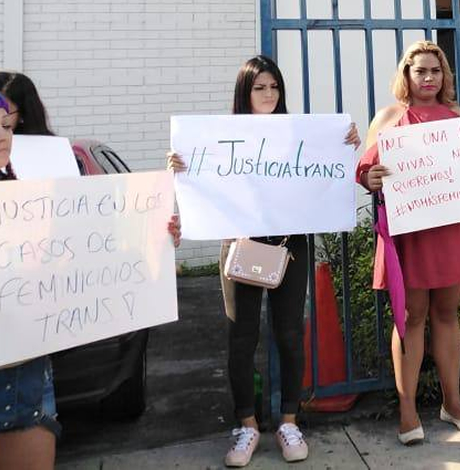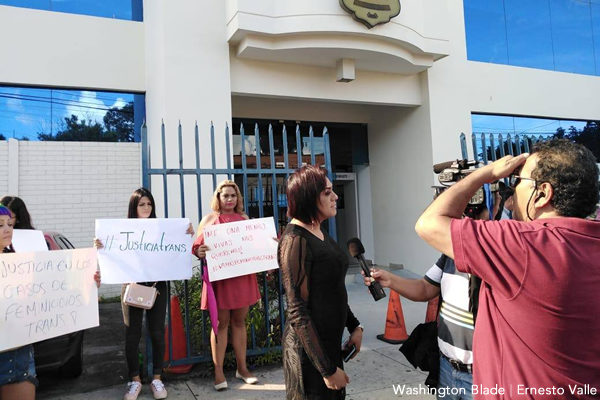News
Población LGBTQ de El Salvador denuncia impunidad ante crímenes por odio
Anahy Rivas, una mujer trans, fue asesinada en San Salvador el 27 de octubre


SAN SALVADOR, El Salvador — La Federación Salvadoreña de Personas Lesbianas, Gays, Bisexuales, Trans e Intersexuales (FESLGBTI), que aglutina a 12 organizaciones LGBTQ del país, realizó el día jueves 31 de octubre del presente año, una conferencia de prensa para dar a conocer su posicionamiento ante la impunidad por los crímenes por odio que han acontecido en los últimos meses.
Entre los casos que se mencionaron están el de Jorge Castillo, el 11 de enero de 2019 que fue asesinado con once disparos en el rostro en el departamento de San Miguel; Camila Díaz, mujer trans privada de libertad por agentes de la policía, recibió múltiples golpes y luego falleció el 31 de enero de 2019; además el caso de “Lolita” asesinada a machetazos en Sonsonate el 8 de febrero de 2019; sin olvidar el caso de “Tity” mujer trans que fue asesinada a golpes en avenida Cuscatlán el 10 de marzo de 2019 y por supuesto el reciente caso de Anahy Rivas que sujetos en una camioneta le sujetaron y le arrastraron sobre el bulevar Los Héroes y luego lesionaron con arma blanca el pasado 27 de octubre del presente.
Desde que se reformó el código penal en el año 2015 en sus artículos 129 y 155, que tipifica los crímenes por odio si se basan en la orientación sexual, identidad y expresión de género; no se han condenado a culpables por los asesinatos de personas LGBTQ, aunque los hechos sean suficiente evidencia que dichos crímenes fueron motivados por el odio y prejuicio hacía las víctimas.
“El sistema de justicia no tiene contabilizados los crímenes de la población LGBTI, porque solo contabilizan por sexo biológicamente asignado, ya sea hombre o mujer”, comenta en conferencia Mónica Linares, directora ejecutiva de Aspidh Arcoíris Trans. Agregaron que en los últimos tres años (2017, 2018 y 2019), han documentado al menos 20 asesinatos a mujeres trans entre los 16 y 32 años de edad, y estos son los casos de los que se dan cuentan las organizaciones y esto solo afirma el hecho que el promedio de vida de una mujer trans en El Salvador no sobre pasa los 33 años.
“En la fiscalía dicen que hay apertura para realizar protocolos para el trato a casos de personas LGBTI. Dicen tener interés de tocas el tema, pero al momento de ejecutar su trabajo, esto no ocurre, por lo cual hay un doble discurso”, asegura Linares.
Debido a estas situaciones y a la gravedad de los hechos que expusieron en la conferencia de prensa, la FESLGBTI exige a la Fiscalía General de la República (FGR) y a la Policía Nacional Civil (PNC), además de las demás entidades que conforman al sector justicia del país, que investiguen los asesinatos a personas LGBTQ, aplicando la reforma al código penal referida a crímenes por odio y buscar así la condena a los culpables.
En especial exigieron a la FGR la pronta aprobación y divulgación con el personal de la fiscalía de una “política de persecución penal y su respectivo protocolo de investigación, de delitos cometidos en contra de la población LGBTI”; pues consideran que es algo impostergable la puesta en marcha de acciones institucionales encaminadas a terminar con la impunidad en los casos de crímenes fundados en el odio y prejuicio en contra de la población LGBTQ.
“Estamos a cuatro días de la evaluación de El Salvador en el examen periódico universal. La CIDH hizo recomendaciones al Estado salvadoreño y ofreció ayuda a través de la Dirección de Diversidad Sexual, la cual está extinta por la nueva administración”, comentaba Bianca Rodríguez, directora ejecutiva de la organización COMCAVIS TRANS.
“Hacemos el llamado a los tres órganos del Estado, responder a estos crímenes por odio, ya no queremos más impunidad, queremos justicias”, agrega Rodríguez.
La FESLGBTI reitera que no permitirán que los crímenes contra la población LGBTQ queden en el anonimato y en silencio por más tiempo; además que no permitirán más vulneración al derecho a la salud, educación, seguridad, trabajo y a la vida digna libre de estigmas y discriminación.
Plantón frente a Fiscalía General de la República.
Un día antes de la conferencia de prensa, diferentes organizaciones como Fundación Somos Familia y Aspidh Arcoíris Trans, se reunieron frente a la FGR para pedir justicia en los crímenes contra la población LGBTQ.
Portando carteles con diferentes consignas, las diferentes personas asistentes mostraron su descontento por la falta de acción de dicha entidad, en el esclarecimiento de los diferentes casos que existen. Linares dio lectura a un comunicado en el que las organizaciones presentes, exigían a la FGR el esclarecimiento de los casos de crímenes por odio.
“Hay una terrible impunidad ante los crímenes LGBTI. Está el caso de Camila Díaz, que al parecer la madre está recibiendo llamadas de familiares de los tres policía detenidos, tratando de intimidarla, tratando de negociar con ella para que los hombres salgan”, comentó al Washington Blade Linares; “había un testigo criteriado que es una mujer policía quien en la primera audiencia reconoció a los tres policías capturados y ahora en la siguiente audiencia solo reconoció a uno que era quien conducía la patrulla y no a los dos que le iban golpeando atrás”.
Linares externó que al parecer ya existe alteración en el único caso que un juez ha dictaminado como crimen por odio, lo cual le hace dudar el resultado del mismo. Al finalizar la protesta fuera las instalaciones de la FGR en avenida la Sultana, Antiguo Cuscatlán, un grupo encabezado por Linares, entregaron en recepción el comunicado al que se le dio lectura, saliendo de las instalaciones con la decisión de seguir la lucha por que se haga justicia por las compañeras y compañeros que han fallecido hasta la fecha.

Texas state Rep. James Talarico won a hard-fought primary Tuesday to become the state’s Democratic nominee for U.S. Senate, defeating U.S. Rep. Jasmine Crockett in one of the year’s most closely watched and competitive Democratic contests.
Talarico, a Presbyterian seminarian and three-term lawmaker from Round Rock, was declared the winner by the Associated Press early Wednesday morning after a closely tracked vote count that drew national attention.
“Tonight, the people of our state gave this country a little bit of hope,” Talarico told the AP. “And a little bit of hope is a dangerous thing.”
With 52.8% of the vote to Crockett’s 45.9%, Talarico secured the nomination outright, avoiding a runoff and capping months of sharp contrasts between the two candidates over strategy, messaging, and how best to compete statewide in Texas. Democrats hope the competitive primary — and the relatively narrow margin — signals growing momentum in a state that has not elected a Democrat to the U.S. Senate since 1988.
Talarico has long expressed support for the LGBTQ community, a position he highlights prominently on his campaign website. Under the “Issues” section, he directly addresses assumptions that might arise from his faith and background as a seminarian in a deeply conservative state.
“My faith in Jesus leads me to reject Christian Nationalism and commit myself to the project of democracy,” his website reads. “Because that’s the promise of America: a democracy where every person and every family — regardless of religion, race, gender, sexual orientation, or any other difference between us — can truly be free and live up to their full potential.”
Crockett struck a conciliatory tone following her defeat, emphasizing party unity ahead of November.
“This morning I called James and congratulated him on becoming the Senate nominee,” Crockett told Politico. “Texas is primed to turn blue and we must remain united because this is bigger than any one person. This is about the future of all 30 million Texans and getting America back on track.”
Talarico also drew national attention earlier in the race when “Late Show” host Stephen Colbert said he was initially unable to air an interview with the state legislator due to potential FCC concerns involving CBS. The episode sparked a broader political debate.
Brendan Carr, chair of the Federal Communications Commission, appointed by President Donald Trump, told reporters the controversy was a “hoax,” though he also acknowledged Talarico’s ability to harness the moment to build support as an underdog candidate. The interview was later released online and garnered millions of views, boosting Talarico’s national profile.
In November, Talarico will face the winner of the Republican primary between incumbent Sen. John Cornyn and Texas Attorney General Ken Paxton, who have been locked in a bruising GOP contest. Rep. Wesley Hunt was also in the Republican primary field. The GOP race is expected to head to a May runoff.
In a joint statement, Senate Minority Leader Chuck Schumer and Democratic Senatorial Campaign Committee Chair Kirsten Gillibrand praised Talarico’s victory and framed him as a candidate capable of broad appeal.
“As an eighth-generation Texan, former middle school teacher, and Presbyterian seminarian, James will be a fighter for Texans from all walks of life and of all political stripes,” they said. “In November, Texans will elect a champion for working people: James Talarico.”
Maryland
Md. Commission on LGBTQIA+ Affairs released updated student recommendations
LGBTQ students report higher rates of bullying, suicide

The Maryland Commission on LGBTQIA+ Affairs has released updated recommendations on how the state’s schools can support LGBTQ students.
The updated 16-page document outlines eight “actionable recommendations” for Maryland schools, supplemented with data and links to additional resources. The recommendations are:
- Developing and passing a uniform statewide and comprehensive policy aimed at protecting “transgender, nonbinary, and gender expansive students” against discrimination. The recommendation lists minimum requirements for the policy to address: name, pronoun usage, and restroom access.
- Requiring all educators to receive training about the specific needs of LGBTQ students, by trained facilitators. The training’s “core competencies” include instruction on terminology, data, and support for students.
- Implementing LGBTQ-inclusive curricula and preventing book bans. The report highlights a “comprehensive sexual education curriculum” as specifically important in the overall education curriculum. It also states the curriculum will “provide all students with life-saving information about how to protect themselves and others in sexual and romantic situations.”
- Establishing Gender Sexuality Alliances “at all schools and in all grade levels.” This recommendation includes measures on how to adequately establish effective GSAs, such as campaign advertising, and official state resources that outline how to establish and maintain a GSA.
- Providing resources to students’ family members and supporters. This recommendation proposes partnering with local education agencies to provide “culturally responsive, LGBTQIA+ affirming family engagement initiatives.”
- Collecting statewide data on LGBTQ youth. The data on Maryland’s LGBTQ youth population is sparse and non-exhaustive, and this recommendation seeks to collect information to inform policy and programming across the state for LGBTQ youth.
- Hiring a full-time team at the Maryland Department of Education that focuses on LGBTQ student achievement. These employees would have specific duties that include “advising on local and state, and federal policy” as well as developing the LGBTQ curriculum, and organizing the data and family resources.
- Promoting and ensuring awareness of the 2024 guidelines to support LGBTQ students.
The commission has 21 members, with elections every year, and open volunteer positions. It was created in 2021 and amended in 2023 to add more members.
The Governor’s Office of Communication says the commission’s goal is “to serve LGBTQIA+ Marylanders by galvanizing community voices, researching and addressing challenges, and advocating for policies to advance equity and inclusion.”
The commission is tasked with coming up with yearly recommendations. This year’s aim “to ensure that every child can learn in a safe, inclusive, and supportive environment.”
The Human Rights Campaign’s most recent report on LGBTQ youth revealed that 46.1 percent of LGBTQ youth felt unsafe in some school settings. Those numbers are higher for transgender students, with 54.9 percent of them saying they feel unsafe in school.
Maryland’s High School Youth Risk Behavior Survey reveals a disparity in mental health issues and concerns among students who identify as LGBTQ, compared to those who are heterosexual. LGBTQ students report higher rates of bullying, feelings of hopelessness, and suicidal thoughts. Nearly 36 percent of LGBTQ students report they have a suicide plan, and 26.7 percent of respondents say they have attempted to die by suicide.
The commission’s recommendations seek to combat the mental health crisis among the state’s LGBTQ students. They are also a call for local and state governments to work towards implementing them.
Virginia
Va. lawmakers consider partial restoration of Ryan White funds
State Department of Health in 2025 cut $20 million from Part B program

The Virginia General Assembly is considering the partial restoration of HIV funding that the state’s Department of Health cut last year.
The Department of Health in 2025 cut $20 million — or 67 percent of total funding — from the Ryan White Part B program.
The funding cuts started with the Trump-Vance administration passing budget cuts to federal HIV screening and protection programs. Rebate issues between the Virginia Department of Health and the company that provides HIV medications began.
Advocates say the funding cuts have disproportionately impacted lower-income people.
The Ryan White HIV/AIDS Program, a federal program started in 1990, provides medical services, public education, and essential services. Part B offers 21 services, seven of which remained funded after the budget cuts.
Equality Virginia notes “in 2025, a 67 percent reduction severely destabilized HIV services across the commonwealth.”
Virginia lawmakers have approved two bills — House Bill 30 and Senate Bill 30 — that would partially restore the funding. The Ryan White cuts remain a concern among community members.
Both chambers of the General Assembly must review their proposed changes before lawmakers can adopt the bills.
“While these amendments aren’t a full restoration of what community-based organizations lost, this marks a critical step toward stabilizing care for thousands of Virginians living with HIV,” said Equality Virginia Executive Director Narissa Rahaman. “Equality Virginia plans to continue their contact with lawmakers and delegates through the conference and up until the passing of the budget.”
“We appreciate lawmakers from both sides of the aisle who recognized the urgency of this moment and will work to ensure funding remains in the final version signed by the governor,” added Rahaman.




















